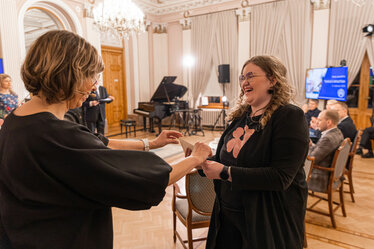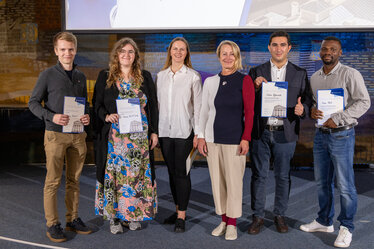Registration for the Three Minute Thesis competition ends on 19 September
University of Tartu doctoral students are welcome to participate in the university’s annual three-minute thesis competition on 2 October to put their presentation skills to the test and gain a wider audience for their research. Presentations are invited from all fields of research in Estonian or English. The best presenters will receive cash prizes and an opportunity to represent the university in follow-up competitions.
To participate in the competition, please fill in the registration form in Estonian or English, depending on the language of your presentation, by 19 September.
According to Hanna Britt Soots, Junior Research Fellow in Mathematics, who won the University of Tartu’s competition in Estonian last year and was in the top five in the Estonian Academy of Sciences’ national competition “Science in Three Minutes”, participation in the competition offers a unique opportunity to look at your research from a different perspective.

“The key to a successful presentation is to go several steps further and consider how your research can contribute to society. Such a perspective will help keep you motivated throughout your doctoral studies,” said Soots. She underlined that the event gives a good overview of how broad and diverse the Estonian research landscape is.
The three-minute thesis competition offers young researchers an excellent opportunity to develop their presentation and communication skills and talk about their research in a different way than usual. In the pitching format, the doctoral students are expected to summarise the problem that prompted their research, its solutions, preliminary results and implications in plain language and a popular science style in no more than three minutes. They should describe for whom and how their research is important and what is new and exciting about the approach. Presentations may be delivered in Estonian or English, and each will be video recorded. Before the competition, all doctoral students can attend a practical training course in English conducted by pitching expert Maret Ahonen on 24 September from 16–18.
The best speakers will represent the university in follow-up competitions
A jury of researchers, journalists and experts will assess the doctoral students’ ability to present their research in a clear and engaging way to a broader audience. The most successful participants will receive cash prizes and an opportunity to represent the University of Tartu in follow-up competitions in Estonia and abroad.

The best three presenters in Estonian will be able to participate in the Estonian Academy of Sciences’ national competition “Science in Three Minutes”. Before the grand finals, the young researchers can attend training sessions by the Academy of Sciences, giving them hands-on experience in presenting in front of the camera and writing a popular science article. The Estonian competition starts with the first training session at the historical village school of Heimtali in Viljandi County on 23–24 November.
The video recording of the best English presentation will be sent to represent the University of Tartu in the international competition of the Coimbra Group of universities. There, the member universities will select the top three participants, who will have the opportunity to present their work in the final competition held during the annual conference of the Coimbra Group.
All participants in the University of Tartu competition will receive written feedback from the jury. Opportunities will be sought to publish each presented thesis through the university’s communication channels or the media to ensure the latest research reaches a wider audience.
Dear doctoral student! Come and challenge yourself and share your exciting research with others!
Check the competition rules and evaluation criteria, useful tips for preparing, and other important information on the university’s website: https://ut.ee/en/3-minute-thesis-competitions.
The competition is organised by the University of Tartu’s Office of Academic Affairs, Marketing and Communication Office and International Cooperation and Protocol Office.


